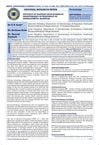 June 2024 in “British Journal of Dermatology”
June 2024 in “British Journal of Dermatology” Permanent hair loss from chemotherapy significantly impacts patients' mental health and social life, highlighting the need for better patient education and support.
 June 2024 in “Research Square (Research Square)”
June 2024 in “Research Square (Research Square)” Finasteride overdose can cause acute pancreatitis.

Women with PCOS have lower self-esteem and body image satisfaction.
 April 2024 in “International Journal of Research Publication and Reviews”
April 2024 in “International Journal of Research Publication and Reviews” Alopecia areata causes hair loss with varied treatment responses and frequent relapses.
 April 2024 in “Journal of asthma and allergy”
April 2024 in “Journal of asthma and allergy” Abrocitinib effectively treated severe atopic dermatitis and mild alopecia areata in a 12-year-old boy after dupilumab failed.
 April 2024 in “Deleted Journal”
April 2024 in “Deleted Journal” Scalp pain should be classified as a type of headache.
 March 2024 in “Deleted Journal”
March 2024 in “Deleted Journal” Bariatric surgery improves health but often causes hair loss and vitamin deficiency.

Herbal remedies might help with hair loss but need more research for safety and effectiveness.
 February 2024 in “Asian journal of medical sciences”
February 2024 in “Asian journal of medical sciences” Proper hygiene, adequate sleep, and self-care can reduce common skin diseases.
 February 2024 in “Journal of ayurveda and integrated medical sciences”
February 2024 in “Journal of ayurveda and integrated medical sciences” Ayurvedic herbs can help manage Polycystic Ovarian Syndrome (PCOS).
 January 2024 in “Hypertension research”
January 2024 in “Hypertension research” More research is needed to understand sex and racial differences in long COVID.
 January 2024 in “International Journal of Health Science”
January 2024 in “International Journal of Health Science” Hormonal implants have many side effects that often outweigh their benefits.
 January 2024 in “International Journal of Health Science”
January 2024 in “International Journal of Health Science” Scalp cooling and low-power light therapy show promise in reducing chemotherapy-induced hair loss but need more research.
 January 2024 in “International Journal of Research Publication and Reviews”
January 2024 in “International Journal of Research Publication and Reviews” The herbal hair serum with rosemary, hibiscus, and neem is safe and effective for hair care.
 January 2024 in “Journal of Pharmacognosy and Phytochemistry”
January 2024 in “Journal of Pharmacognosy and Phytochemistry” Rosemary hair serum promotes healthier, stronger, and shinier hair.
 December 2023 in “Journal of health and rehabilitation research”
December 2023 in “Journal of health and rehabilitation research” Oral Apremilast effectively treats alopecia areata in most patients.
 November 2023 in “Magna Scientia Advanced Research and Reviews”
November 2023 in “Magna Scientia Advanced Research and Reviews” Trazodone might help reverse post finasteride syndrome.

Alopecia areata patients have higher levels of certain immune receptors, suggesting new treatment possibilities.
 November 2023 in “Curēus”
November 2023 in “Curēus” Melatonin may help manage PCOS by improving insulin sensitivity, hormone balance, and mood.
 November 2023 in “Research Square (Research Square)”
November 2023 in “Research Square (Research Square)” Finasteride affects the male rat brain by reducing certain protein activation, but these effects may reverse after stopping the drug.
 November 2023 in “Curēus”
November 2023 in “Curēus” Higher stress levels are linked to more skin problems, especially in young women.
 October 2023 in “International Journal of Science and Research (IJSR)”
October 2023 in “International Journal of Science and Research (IJSR)” Early diagnosis of GLPLS is crucial to prevent complications, but scarring alopecia is irreversible.
 August 2023 in “International Journal For Multidisciplinary Research”
August 2023 in “International Journal For Multidisciplinary Research” Ayurvedic treatment, exercise, and a healthy diet can effectively manage PCOD symptoms.
 August 2023 in “International journal of basic and clinical pharmacology”
August 2023 in “International journal of basic and clinical pharmacology” Herbal hair serum promotes natural hair growth and maintains healthy hair.
 July 2023 in “International Ayurvedic medical journal”
July 2023 in “International Ayurvedic medical journal” Ayurvedic treatment can effectively manage PCOS and its symptoms.
 July 2023 in “Journal of Natural Remedies”
July 2023 in “Journal of Natural Remedies” Shell ginger contains kavalactones that promote hair growth and have anti-cancer, anti-inflammatory, and anti-obesity effects.
 July 2023 in “The Egyptian Journal of Hospital Medicine ”
July 2023 in “The Egyptian Journal of Hospital Medicine ” The conclusion is that emotional support and a variety of treatments are important for alopecia areata, but more research is needed.
 June 2023 in “Benha Journal of Applied Sciences”
June 2023 in “Benha Journal of Applied Sciences” Acne is caused by multiple types of bacteria.
 June 2023 in “British journal of dermatology/British journal of dermatology, Supplement”
June 2023 in “British journal of dermatology/British journal of dermatology, Supplement” A nurse-led hair service reduced waiting times and improved patient satisfaction and outcomes for alopecia areata treatment.
 May 2023 in “PARIPEX INDIAN JOURNAL OF RESEARCH”
May 2023 in “PARIPEX INDIAN JOURNAL OF RESEARCH” Platelet-rich plasma is an effective and safe treatment for male pattern hair loss.





























